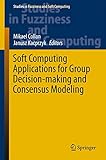Soft Computing Applications for Group Decision-making and Consensus Modeling [electronic resource] / edited by Mikael Collan, Janusz Kacprzyk.
Contributor(s): Collan, Mikael [editor.] | Kacprzyk, Janusz [editor.]
| Kacprzyk, Janusz [editor.] | SpringerLink (Online service)
| SpringerLink (Online service) .
.
Material type:  BookSeries: Studies in Fuzziness and Soft Computing: 357Publisher: Cham : Springer International Publishing : Imprint: Springer, 2018Edition: 1st ed. 2018.Description: XXV, 488 p. 66 illus., 10 illus. in color. online resource.Content type: text Media type: computer Carrier type: online resourceISBN: 9783319602073.Subject(s): Computational intelligence
BookSeries: Studies in Fuzziness and Soft Computing: 357Publisher: Cham : Springer International Publishing : Imprint: Springer, 2018Edition: 1st ed. 2018.Description: XXV, 488 p. 66 illus., 10 illus. in color. online resource.Content type: text Media type: computer Carrier type: online resourceISBN: 9783319602073.Subject(s): Computational intelligenceOptimal Group Decision Making Can Help Decrease Poverty, Inequality, and Discrimination -- An Overview and Re-Interpretation of Paradoxes of Responsiveness -- Veto in Yes-no and Yes-no-abstain Voting Systems -- Power Indices for Finance -- The binomial decomposition of the single parameter family of GB welfare functions -- The logic of information and processes in the system-of-systems applications -- Decision-making Process using Hyperstructures and Fuzzy Structures in the Social Sciences -- Social Preferences through Riesz Spaces: A First Approach -- Coherent conditional plausibility: a tool for handling fuzziness and uncertainty under partial information -- Intuitionistic fuzzy interpretations of some formulas for estimation of preference degree -- Fuzzified Likert Scales in Group Multiple-criteria Evaluation -- Maximal Entropy and Minimal Variability OWA Operator Weights: A Short Survey of Recent Developments.
This book offers a concise introduction and comprehensive overview of the state of the art in the field of decision-making and consensus modeling, with a special emphasis on fuzzy methods. It consists of a collection of authoritative contributions reporting on the decision-making process from different perspectives: from psychology to social and political sciences, from decision sciences to data mining, and from computational sciences in general, to artificial and computational intelligence and systems. Written as a homage to Mario Fedrizzi for his scholarly achievements, creative ideas and long lasting services to different scientific communities, it introduces key theoretical concepts, describes new models and methods, and discusses a range of promising real-world applications in the field of decision-making science. It is a timely reference guide and a source of inspiration for advanced students and researchers.


There are no comments for this item.